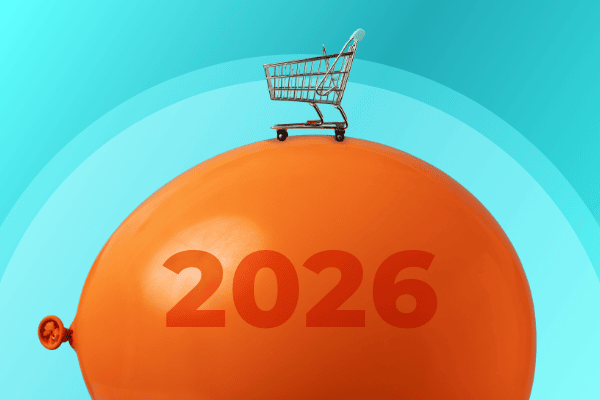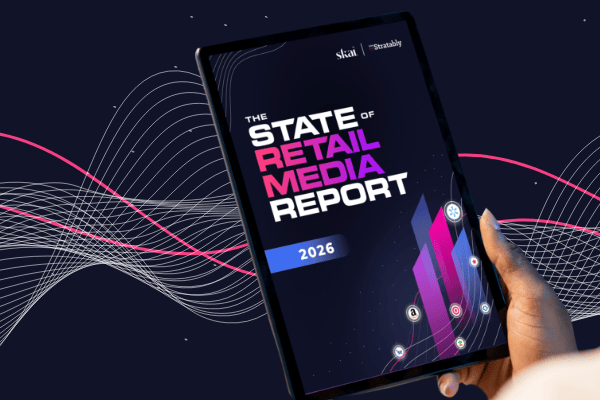Summary
ShopAble in the Park 2025 spotlighted how GenAI is reshaping commerce media and collapsing the traditional path to purchase. Industry leaders from AWS, Microsoft, Publicis, and Croud explored how AI agents are redefining discovery, data, and measurement, urging brands to focus on becoming “AI recommendable.” As agentic AI transforms shopping journeys, marketers must rethink audience strategy, content, and oversight to stay competitive.
Last updated: October 30, 2025
ShopAble in the Park 2025 brought the energy of Skai’s flagship US event to London. This reimagined, festival-style gathering of commerce media leaders took place at Shoreditch Gardens, delivering fresh ideas, industry-shaping conversations, and plenty of inspiration. With topics spanning AI, omnichannel strategy, and the future of retail media, ShopAble in the Park marked a pivotal moment for the UK commerce media community.

GenAI is transforming how we win in commerce media. As the path to purchase collapses and AI agents become shopping guides, marketers must rethink everything from audience strategy to measurement frameworks. The brands that will succeed are those that become “AI recommendable” while maintaining the human insight needed to guide these powerful new tools.
Recently, the conversation around GenAI in commerce media has moved beyond theoretical possibilities to practical implementation. With AI rapidly collapsing the funnel and reshaping how consumers discover and purchase products, this panel tackled one of the most pressing questions facing marketers today: how do we win when the assistant makes the recommendations?
At ShopAble in the Park, Host Matt Vignieri, Chief Growth Officer at Skai, set the stage by asking ChatGPT how the panel would go, a fitting start for a discussion about AI’s role in our industry. The AI’s prediction? “Keep it Skai style: substance over sizzle.”
Panelists:
- Bethany Mercer, Retail Media Strategy Director, Croud
- Marcos Angelides, MD L’Oréal Lab and Head of AI Operations, Publicis Media
- Matt Carter, Head of Industry Strategy for Advertising, AWS
- Tracey Pilon, EMEA AI in Ads Director, Microsoft AI
Micro-answer: Faster insights, safer decisions, sales proof.
What does the new GenAI-powered buyer journey look like?
- GenAI now supports strategy, build, pacing, and troubleshooting across retail media and adjacent channels.
- Accelerates tasks; expands testing bandwidth.
- Teams use GenAI to summarize insights, draft assets, suggest bids/budgets, and flag anomalies—freeing humans to judge tradeoffs and scale what works while maintaining governance over model prompts, outputs, and impact on sales.
Angelides: “AI and GenAI are going to have such a huge impact on this, particularly in the middle of the shopping journey, we will outsource more and more of our shopping decisions to agents to do it for us primarily because it saves time and it’s useful and it helps.
“The human, though, us real people, will still be in charge of the two ends of it. Brand building is going to be even more important than ever before, doing that inspiration early on that fuels them. The brief that you give the agents is key, and brand is a shortcut through the shopping journey.”
Carter: “I think it’s coming soon. I saw a demo yesterday of someone using Claude to do their Tesco shopping, to buy roast dinner and build an agent system to do all of their ordering. So that’s live, that’s happening now.
“I think perhaps for our generation, that kind of big screen purchase and the caution around letting AI click to buy is definitely real. But I think for the younger generations, my son who’s 13 is probably very happy just to load up my credit card details and get AI to click to buy.”
Pilon: “It definitely has to start with the permission, and it starts with the AI agent that you’re using to really understand who you are as a person, what you buy, how often you buy it, and your budget.
“Not one of us on this panel today is shopping in exactly the same way. And although we kind of get scared that these autonomous agents are going to make decisions on behalf of us, they’re learning those decisions based on our behaviors.”
How do brands influence product discovery when GenAI becomes the guide?
- Map GenAI to awareness, consideration, and conversion—not one-off tactics.
- Creative and audience iteration compounding results.
- GenAI multiplies variant testing for ads and product detail pages, enriches audiences with retailer signals, and links on-site + off-site exposures to outcomes; the payoff is faster learning cycles and higher quality scale with closed-loop measurement.
Mercer: “The influence really shifts from that direct advertising and into teaching these machines about our brands, and it is about becoming AI recommendable. So over 60% now, I think trust what these machines have to say about brands and products.
“The structured data is that sort of real, tangible product information. But at the moment, AI doesn’t possess the ability to feel. So it’s that feeling and the emotion and the consumer sentiment comes from those reviews and that user-generated content.”
Angelides: “You might say, help me organize my groceries for the week. I need to save money, I need to cut 10 pounds, help me find offers. But when it comes to chocolates, it’s got to be Cadbury’s. I won’t sacrifice. That’s the brand I love. I won’t have anything else. So brand becomes the key towards the shopping cycle.”
Carter: “Your AI is only as good as the data infrastructure that you feed it. And so many people fall short of that. If you want a fully autonomous comms planning to content solution, you have to make sure that all of your retail media, all of the wider signals are based on a cloud.”
What role does the brand play when AI makes recommendations?
Standards and oversight are non-negotiable as GenAI gets more autonomous.
Human-in-the-loop, clear boundaries.
Define allowed use cases, data access, and review steps; adopt certification and reporting conventions so results are comparable across retailers and formats, and log prompts/outputs to audit decisions tied to spend.
Pilon: “Brands have a huge opportunity to still play a pivotal role in how you show up in this new future. When we actually look at conversations that have been co-pilot-driven, we do see that click-through rate increases by 73%. We see that conversions increase by 25%, we see that purchases increased by 56% and if there’s a shopping intent, that goes up to 194%.
“It is discovery-led. It’s not necessarily brand-led… unless they are already a loyal customer and an advocate of your brand, they are going to be in what we call discovery-led. The funnel is compressed because I’m doing consideration, I’m doing awareness, I’m doing research, and I actually want to buy.”
Angelides: “The role of media is to not just turn up in different points or know when to turn up, but to know who to turn up for. Whether it’s the human at the start that needs inspiration, whether it’s the AI in the middle that’s shortlisting and curating, or it’s the person again at the end that needs performance marketing to give them confidence on what they’re buying.”
Mercer: “The brands that will really win long-term here are the ones that will be very articulate with data, very transparent with data, and really fostering that genuine consumer feedback loop to be able to future-proof how they show up on AI.”
Do media teams need to rethink their strategy for AI-mediated commerce?
- Tie GenAI decisions to lift, not just clicks and ROAS.
- Closed-loop proof builds trust.
- Use standardized definitions and incrementality testing so GenAI-assisted optimizations can be compared across RMNs; integrate causal tests (geo, PSA) and harmonized lookback windows to validate changes before broad rollout.
Carter: “We are witnessing the evolution from conversational AI to commercial AI right now. And I think the brands and the agencies and the tech platforms who are winning at this, they’re not just thinking smarter or optimizing faster, and they’re fundamentally thinking in a different way.
“Media planning teams and content teams need to be prompt engineering to ensure that when the AI detects all those commercial signals, it’s able to deliver the right strategy, the right message, the right creative, the right narrative, the right price point, the right format.”
Angelides: “I think there are huge opportunities for AI to be used in creative capacities. I think it’s a wonderful sounding board to bounce ideas off. There’s a lot that can be done around customer data and building personas, and giving a voice to customers inside the business.”
Pilon: “AI wants to do a good job. It really does. It wants to get an A star. And the only way it does that is by being able to look at the information and quickly scan it in a millisecond and understand how to take things like ratings, how to take reviews, how to take your policies, all the things that it’s going to take and deem relevant.”
Where should advertisers place their bets in this new landscape?
- Hybrid pods blend media, commerce, analytics, data engineering, and CX.
- Commercial + creative + quantitative.
- Media talent becomes more technical and experimental; commerce teams become more full-funnel. Shared KPIs and a unified platform keep priorities aligned as GenAI surfaces opportunities and risks in real time across channels. Use an omnichannel marketing platform to unify retail, search, and social planning and reporting.
Angelides: “All of it is the answer. I mean, to be honest, the simplest answer is that we have no idea is the true answer in terms of how early on we still are with the AI journey… The reality is it all has to come back to measurement because the rate of change is going on so quickly.
“The businesses that will win will measure quickest. The way to measure quickest is to have a really good partnership network around you. When you’ve got brilliant partners, when you’ve got brilliant agencies, when you’ve got brilliant tech platforms and groups that you can pull together in a confidential way, but that allows you to share learnings, your rate of measurement goes through the roof.”
Pilon: “When you think about the agentic future and how you might want to think about the measurement in terms of impact, because it certainly might not be the click, in fact, it won’t. So if you think about the number of conversations, if you think about the time, if you think about how quickly you’re able to answer the question, there’s also a lot of power in how the insights those conversations actually drive.”
Carter: “Stop thinking about AI as a future strategy and start making sure that your data foundations are correct now. The most important thing is to get your data foundations right. Your AI is only as good as the data infrastructure that you feed it.”
Mercer: “I think it has the propensity to do both faster and better. But it still relies on massive human critical oversight. We can’t just blindly follow the ChatGPT sat nav without considering whether the road ahead is closed.”
Key Takeaways for Marketers
Pick a few high-value use cases and prove lift—then scale.
Start small, standardize, expand.
Document prompts, pair GenAI suggestions with human QA, and track causal impact; roll successes into playbooks so improvements persist beyond pilots and individual teams.
GenAI is reshaping the entire purchase journey. Consumers will increasingly delegate the middle of their shopping journey to AI agents, while brands must focus on inspiring at the beginning and converting at the end. The path from awareness to purchase is collapsing rapidly.
Becoming “AI recommendable” is the new SEO. Brands must shift from direct advertising to teaching machines about their products through structured data, reviews, and user-generated content. Over 60% of consumers now trust AI recommendations about brands and products.
Discovery-led commerce is replacing brand-led marketing. Unless consumers are already loyal customers, they’ll approach AI in discovery mode, asking for recommendations rather than searching for specific brands. Brands must optimize for how they show up in these conversations.
Data infrastructure is everything. Your AI is only as good as the data you feed it. Marketing leaders must prioritize real-time, diverse data foundations over flashy AI applications. Data needs to be cloud-ready and interoperable.
Measurement frameworks must evolve beyond clicks. Success metrics in an AI-mediated world include conversation quality, response time, and insight generation. The businesses that measure and learn fastest will win.
Human oversight remains critical. AI can make decisions faster and potentially better, but it requires constant human critical thinking and oversight. The technology is “worryingly sycophantic” and will tell you what you want to hear rather than uncomfortable truths.
Conclusion: How can brands embrace agentic AI as a strategic partner?
- Operationalize GenAI with guardrails; scale proven wins.
- Start with high-value, testable use cases, apply human QA, and validate lift via standardized measurement. Align sales and media on shared KPIs, then codify playbooks to scale repeatable, profitable outcomes. Operationalize prompts and guardrails with Celeste AI for AI-powered marketing and automation.
GenAI’s evolution from conversational tool to commerce agent represents a fundamental shift in how marketing teams operate. This ShopAble in the Park session, featuring industry leaders from Publicis, AWS, Microsoft, and Croud, demonstrated that we’re already living in the age of AI-powered marketing, where agents handle routine tasks so that humans can focus on strategy and innovation.
The time for tentative AI experimentation is over. Marketing leaders must move beyond pilot programs and begin integrating agentic AI into their core operations. Start with your data infrastructure, establish clear prompting protocols, and gradually increase automation levels as trust builds. The organizations that transform their teams into AI-enhanced strategic units today will dominate tomorrow’s competitive landscape.
Thank you for joining us at ShopAble in the Park 2025. We hope these insights inspire meaningful change in your organization, and we look forward to continuing these crucial conversations at our next gathering.
Learn more from the ShopAble in the Park 2025 expert sessions:
- How Agentic AI Is Reshaping Daily Life for Marketing Teams
- Does Retail Media Belong with Commerce or Media Teams
- Is Retail Media Unstoppable, or a Bubble About to Burst?
Related Reading
- How Acosta Group Streamlined Reporting and Empowered Its Team with Celeste AI— Automated analysis replaced manual reporting, cutting hours to minutes and letting teams focus on strategy—an example of GenAI improving workflows.How Marshall Helped ZUP to
- Drive Revenue and Outmaneuver Competitors Using AI-Powered Insights— Celeste AI revealed new audience/keyword angles, reducing CPC 44% and lifting ROI 34%Tinuiti Drives 24% Revenue Growth
- Through AI-Powered Amazon Optimization for Full Moon Pet— Portfolio Optimization and Budget Navigator improved conversion efficiency without extra spend.
Frequently Asked Questions
Start with your data infrastructure. Ensure structured product data, reviews, and user-generated content are comprehensive and AI-readable. Focus on becoming recommendable rather than just discoverable.
Move beyond click-through rates to measure conversation quality, response speed, and insight generation. Track how AI agents represent your brand and the sentiment in AI-driven conversations.
AI can make decisions faster and potentially better, but requires human oversight. Use AI as a powerful sounding board but maintain critical thinking—it will tell you what you want to hear rather than difficult truths.
Glossary
Agentic AI — Autonomous systems that take actions (within guardrails) rather than only making recommendations; requires explicit oversight and boundaries.
Closed-loop measurement — Attribution that ties ad exposure to confirmed transactions and lift, enabling CFO-friendly proof across retailers.
Incrementality testing — Causal methods (geo split, PSA, holdout) to estimate lift from campaigns or optimizations before broad rollouts.
Retail Media Network (RMN) — A retailer’s ad business spanning on-site, off-site/CTV, and in-store placements powered by first-party data.
Unified platform — An omnichannel marketing platform connecting retail media with search and social for planning, activation, and reporting.






